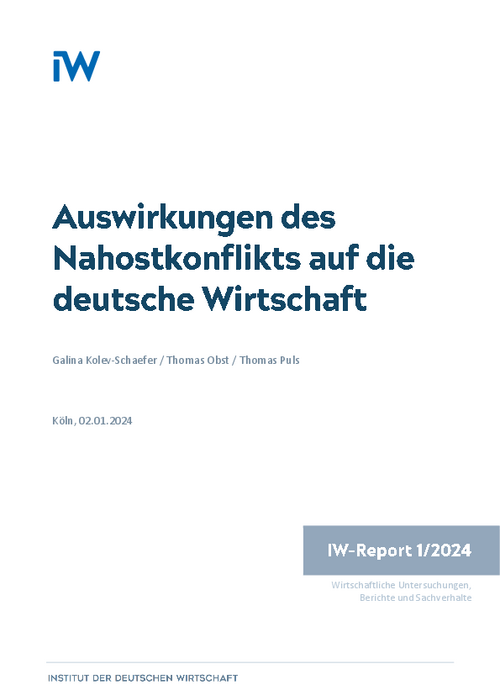Beyond the humanitarian crisis associated with the geopolitical conflict in Israel, which affects millions of human lives, the Middle East conflict also leaves lasting marks on economic activity not only in the affected region, but also in Germany and the world as a whole. This report discusses the various ways in which the conflict is impacting the German economy.

Effects of the Middle East conflict on the German economy

Beyond the humanitarian crisis associated with the geopolitical conflict in Israel, which affects millions of human lives, the Middle East conflict also leaves lasting marks on economic activity not only in the affected region, but also in Germany and the world as a whole. This report discusses the various ways in which the conflict is impacting the German economy.
The geopolitical conflict led to turbulence on both the financial markets and the oil market. Increased risk premiums raised financing costs for indebted countries, and higher uncertainty shifted demand of international investors towards for safe havens, which was reflected in a permanently higher gold price. The risk of bloc formation in the global economy, which had already increased due to the trade conflict between the USA and China and the Russian war of aggression in Ukraine, took on a new dimension, which once again shook the business model of many German companies based on the international division of labor. Although the situation on the oil market calmed down somewhat, discussion arose about the threat of a new oil price shock. Model simulations using the Global Economic Model from Oxford Economics show that an increase in the price of oil to $150 per barrel (Brent) is associated with a decline in overall economic output in Germany of around 1 percent and an increase in consumer prices by 1.3 percent within two years. However, the results of the present analysis also show that the probability of such a scenario is very low. The oil intensity of overall economic production has fallen sharply in recent decades and Europe and the USA are significantly less dependent on oil supplies from the Persian Gulf, which makes the use of the “oil weapon” less likely. In particular, the weakening global economy and the associated decline in oil demand have already significantly reduced the price of oil just a few weeks after the start of the conflict and the forecasts assume a significantly lower oil price than the one whose effects were examined in the extreme scenario mentioned above. Nevertheless, the tense geopolitical situation remains an important brake on the recovery of the economy - both in Germany and worldwide.

Effects of the Middle East conflict on the German economy

More on the topic

Determinants of personnel planning in Germany
The German labor market has been growing since 2005. The dip in the wake of the coronavirus pandemic between 2020 and 2022 is an exception, as the German labor market has reached a record level of 45.9 million people in employment by 2023.
IW
Corporate Insolvencies on the Increase
After a prolonged decline, the number of corporate insolvencies has begun to rise again. The slight increase in 2022 could be interpreted as a step towards normalisation after the sharp drop experienced during the 2020/21 Covid19 pandemic.
IW